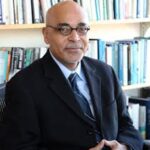Register for The Herbert Benson, MD Course in Mind Body Medicine October 30 – November 1, 2025
Register for The Herbert Benson, MD Course in Mind Body Medicine October 30 – November 1, 2025
Harvard Medical School CME In-Person in Boston, MA AND via Live Streaming
Registration is now open for The Herbert Benson, MD Course in Mind Body Medicine, the Benson-Henry Institute’s celebrated continuing medical education (CME) course, offered in partnership with Harvard Medical School.
The course will be held live, in person at the Fairmont Copley Hotel in Boston, MA and will be livestreamed to participants around the world. Video recordings of all talks will be available to all conference-goers for up to 60 days. BHI is also offering two optional online pre-course workshops, Mind Body Approaches to Weight Management and Group Medical Visits to Guide Patients to Healthier Lifestyle Behaviors.
“The Herbert Benson Course in Mind Body Medicine is an opportunity for clinicians, researchers, scientists and mind body enthusiasts to explore the latest research and learn the best techniques in mind body medicine. Our work – providing patients with skills to build resilience and improve wellbeing – are essential as we rebound from the pandemic and face a multitude of other stressful challenges at home and abroad. We are so pleased to be able to meet each other again in person this fall, and to provide online streaming to participants around the world. The course provides a wonderful opportunity to connect and collaborate with colleagues around the world,” said BHI Director Gregory Fricchione, MD. “We have an impressive line-up of keynotes and experts in the field, and we offer two wonderful optional half-day courses on mind body approaches to weight management and delivering mind body medicine in group visits.”
Keynote speakers are Yvette Cozier, DSc, an investigator on the Black Women’s Health Study (BWHS) and the BWHS Sarcoidosis Study at the Slone Epidemiology Center at Boston University; Stephen Post, PhD, a researcher and expert on the benefits and links between altruism, compassion, happiness, healing and health; Adam Rodman, MD, MPH, whose research research focuses on medical education, clinical reasoning, integration of digital technologies, and human-computer interaction, especially with AI; Dr. K.“Vish” Viswanath, PhD, who studies how communication and social media can impact health decisions, mitigate adversity and build resilience; and Rochelle Walensky, MD, MPH, the 19th Director of the Centers for Disease Control and Prevention during the COVID 19 pandemic and currently a Senior Fellow of the Women and Public Policy Program at the Harvard Kennedy School of Government.
This program is among the highest-rated Harvard Medical School CME course. The Harvard Medical School is accredited by the Accreditation Council for Continuing Medical Education (ACCME) to provide continuing medical education for physicians. The Harvard Medical School designates this live activity for a maximum of 25.75 AMA PRA Category 1 Credits™. Physicians should claim only the credit commensurate with the extent of their participation in the activity. For additional accreditation information, please see below.
Participants will get
- The latest clinical approaches and integrative models of care
- Cutting-edge research into the linkages between the brain and the body
- Education on genomics, transcriptomics, metabolomics ad how to leverage recent advances in the neuroimaging of contemplative states
- Current data on stress, stress management and resilience enhancement, and their impacts on patient health and treatment options
For course scheduling, information and to register, please visit mindbody.hmscme.com. Register by September 20th for an early bird discount.
About our Keynotes
 Yvette Cozier, ScD
Yvette Cozier, ScD
Dr. Yvette Cozier is an Associate Professor of Epidemiology, and the Associate Dean of Diversity, Equity, Inclusion and Justice (DEIJ) at Boston University School of Public Health. She is also a Senior Epidemiologist at the Slone Epidemiology Center at Boston University School of Medicine where she co-leads the Black Women’s Health Study (BWHS), a National Institutes of Health (NIH)-funded follow-up of over 59,000 African American women begun in 1995.
As of July 1st, Dr. Cozier is the Immediate Past President of the Society for Epidemiologic Research (SER), the nation’s oldest and largest general epidemiology organization. As a social epidemiologist, Dr. Cozier’s overall research focus is on the influence of psychosocial and structural factors (e.g., interpersonal racism, neighborhood socioeconomic status) – on health, including the development of chronic cardiometabolic (obesity, type-2 diabetes), immune-mediated (lupus, sarcoidosis, inflammatory bowel disease), neurologic (Insomnia, Parkinson’s disease) and dental (periodontal disease, tooth loss) conditions.
She has published several articles on the role of attitudes about spirituality and religiosity on health.
 Stephen Post, PhD
Stephen Post, PhD
Stephen G. Post is Professor of Family, Population and Preventive Medicine & Founding Director of the Center for Medical Humanities, Compassionate Care and Bioethics (2008-present) at Stonybrook University. Previously he was Professor of Bioethics in the Department of Bioethics of the Case Western Reserve University School of Medicine (1988-2008). He also taught at the University of Chicago Pritzker School of Medicine.
Dr. Post is an Elected Fellow of the New York Academy of Medicine (2013-present), and of the College of Physicians of Philadelphia for “distinguished contributions to medicine” (2004-present). He is an elected Fellow of the Hastings Center “for distinguished contribution to ethics and the life sciences” (1994 -present) and of the Kennedy Institute of Ethics, Georgetown University (1990-1995).
He has received the United States Congress Certificate of Special Recognition “In Recognition of Outstanding Achievement” (2012); and the Pioneer Medal for Outstanding Leadership in Health Care (shared with Dr. Edmund D. Pellegrino, MD) from HealthCare Chaplaincy New York (2012).
Post was selected as the Public Member of the United States Medical Licensing Examination (USMLE) Composite Committee (jointly established by the Federation of State Medical Boards of the United States and the National Board of Medical Examiners, the Composite Committee is responsible for oversight and policy in all aspects of the USMLE program) (2000-2003); he was reappointed on the basis of “greatly appreciated contributions” for a second term (2004).
Dr. Post is the primary author of over 200 articles in peer-reviewed journals such as Science, Annals of Internal Medicine, The Journal of Religion, The American Journal of Psychiatry, First Things, Dementia, The Journal of the American Medical Association, and The Lancet. Post served as Editor-in-Chief of the 5-volume Encyclopedia of Bioethics, 3rd edition (Macmillan Reference 2004). His best-selling books include The Hidden Gifts of Helping and Why Good Things Happen to Good People (with co-author Jill Neimark). He is the editor of 14 books and the author of eight.
His book The Moral Challenge of Alzheimer’s Disease: Ethical Issues from Diagnosis to Dying (Johns Hopkins University Press, 2000, 2nd edition) was designated a “medical classic of the century” by the British Medical Journal (2009), which wrote, “Until this pioneering work was published in 1995 the ethical aspects of the one of the most important illnesses of our aging populations were a neglected topic.” Post is an elected Member of the Medical and Scientific Advisory Board of Alzheimer’s Disease International, and one of only three recipients of the Alzheimer’s Association Distinguished Service Award “in recognition of personal and professional outreach to the Alzheimer’s Association Chapters on ethics issues important to people with Alzheimer’s and their families” (1998).
Post has been quoted in more than 3,000 national and international newspapers and magazines including the New York Times, the Los Angeles Times, U.S. News and World Report, The Wall Street Journal, the Washington Post, Psychology Today, and USA Today. He has also been interviewed on major television and radio news shows, including ABC 20/20 Holiday Special 2006 on “Giving in America,” Nightline, The Daily Show, John Stossel, “Talk of the Nation,” and The Dr. Oz Show
 Adam Rodman, MD, MPH
Adam Rodman, MD, MPH
Adam Rodman is a general internist and medical educator at Beth Israel Deaconess Medical Center and an assistant professor at Harvard Medical School. He is the Director of AI Programs for the Carl J. Shapiro Center for Education and Research and he leads the task force for integration of AI into the medical school curriculum. He is also an associate editor at NEJM AI. His research focuses on medical education, clinical reasoning, integration of digital technologies, and human-computer interaction, especially with AI. His first book is entitled “Short Cuts: Medicine,” and he is the host of the American College of Physicians podcast Bedside Rounds.
Adam completed his residency in internal medicine at Oregon Health and Science University in Portland, OR, and his fellowship in global health at Beth Israel Deaconess Medical Center while practicing in Molepolole, Botswana. He lives in Boston with his wife and two young sons.
 Kasisomayajula Viswanath, PhD
Kasisomayajula Viswanath, PhD
Dr. K. “Vish” Viswanath is Lee Kum Kee Professor of Health Communication in the Department of Social and Behavioral Sciences at the Harvard T. H. Chan School of Public Health (HSPH) and in the McGraw-Patterson Center for Population Sciences at the Dana-Farber Cancer Institute (DFCI). He is also the Faculty Director of the Health Communication Core of the Dana-Farber/Harvard Cancer Center (DF/HCC). Other additional administrative and scientific leadership positions held by Dr. Viswanath include: Director of the Center for Translational Communication Science, DFCI; Director, Harvard Chan India Research Center and Director, Lee Kum Sheung Center for Health and Happiness, Harvard Chan. He is the founding Director of DF/HCC’s Enhancing Communications for Health Outcomes (ECHO) Laboratory.
Dr. Viswanath’s work is driven by two fundamental concerns: (a) how to center equity in drawing on translational communication science to promote health and well-being for ALL population groups, and (b) to involve community-based organizations and stakeholders through participatory research in promoting social change. The ultimate goal of the program of research in his lab is to influence public health policy and practice through knowledge translation and translational communication. His work draws from literatures in communication science, social epidemiology, dissemination and implementation, and social and health behavior sciences.
His work so far has documented the relationship between communication inequalities, poverty and health disparities, and knowledge translation to address health disparities. He has written more than 300 journal articles and book chapters concerning communication inequalities and health disparities, knowledge translation, public health communication campaigns, e-health and digital divide, public health emergency preparedness and the delivery of health communication interventions to underserved populations. He is the Co-Editor of four books and monographs: Mass Media, Social Control and Social Change (Iowa State University Press, 1999), Health Behavior and Health Education: Theory, Research & Practice, 5th Ed. (Jossey Bass, 2015), The Role of Media in Promoting and Reducing Tobacco Use (National Cancer Institute, 2008) and A Socioecological Approach to Addressing Tobacco-Related Health Disparities (National Cancer Institute, 2017) and a co-author of The First 1000 Days of Life: Lessons from Social and Behavior Change Communication (Ministry of Women and Child Development, Government of India, 2021). He was also the Editor of the Social and Behavioral Research section of the 12-volume International Encyclopedia of Communication (Blackwell Publishing, 2008)
He has served and continues to serve on several national committees including for the US Department of Health and Human Services (HHS), the Centers for Disease Control and Prevention (CDC) and the National Academy of Sciences, Engineering and Medicine (NASEM). He is currently the Chair of NASEM’s Consensus Study Committee on Understanding and Addressing Science Misinformation, a member of the Standing Committee on Advancement of Science Communication at NASEM, and was a member of NASEM’s Planning Committee on The Public Health Infodemic and Trust in Public Health as a National Security Threat: A Workshop.
In recognition of his academic and professional achievements, Dr. Viswanath received several awards and honors.
 Rochelle Walensky, MD, MPH
Rochelle Walensky, MD, MPH
Dr. Rochelle Walensky served as the 19th Director of the Centers for Disease Control and Prevention (2021-2023), Professor of Medicine, Harvard Medical School (2012-2021), and Chief of the Division of Infectious Diseases, Massachusetts General Hospital (2017-2021). She currently serves as a Senior Fellow of the Women and Public Policy Program at the Harvard Kennedy School of Government. She is also a Hauser Leader, at the Center for Public Leadership, Senior Fellow, Belfer Center for Science and International Affairs and an Executive Fellow of the Harvard Business School.
Dr. Walensky is an infectious disease clinician whose research career is guided by a belief that the clinical and economic outcomes of medical decisions can be improved through the explicit articulation of choices, the systematic assembly of evidence, and the careful assessment of comparative costs and benefits. She has focused these beliefs on mathematical model-based research toward the promotion of global access to HIV prevention, screening, and care. Her ground-breaking work and over 300 research publications have motivated changes to US HIV testing and immigration policy; promoted expanded funding for HIV-related research, treatment, and the President’s Emergency Plan for AIDS Relief (PEPfAR); and led to policy revisions toward aggressive HIV screening – especially for the underserved – and earlier treatment in resource-limited international settings. In light of these contributions, Dr. Walensky has been an active member of policy discussions at the WHO, UNAIDS, the DHHS HIV Guidelines Committee, and the NIH Office of AIDS Research.
Dr. Walensky served on the frontlines of the COVID-19 pandemic in Massachusetts until beginning her tenure at the CDC on January 20th, 2021. While at the CDC, Dr. Walensky led the nation—and the world—through unprecedented times, navigating the darkest days of the COVID-19 pandemic and further facing the largest density of diverse infectious threats likely ever seen in this country. During her tenure, she participated in nearly 100 press conferences and countless media appearances, and provided testimony at 17 Congressional hearings.
Dr. Walensky is a member of the American Academy of Physicians, National Academy of Medicine and the Council on Foreign Relations. She currently serves on the Board of Trustees at the Doris Duke Foundation and The Carter Center.
Dr. Walensky received her BA (Biochemistry and Molecular Biology, 1991) from Washington University in St. Louis; her MD from the Johns Hopkins School of Medicine (1995) and her MPH from the Harvard School of Public Health (Clinical Effectiveness, 2001). She completed her Internal Medicine residency at the Johns Hopkins Hospital (1995-1998) and her Infectious Disease fellowship at the Massachusetts General/Brigham and Women’s Hospital combined program (1998-2001).
ADDITIONAL ACCREDITATION INFORMATION:
NURSE PRACTITIONERS and REGISTERED NURSES
Harvard Medical School designates this live activity for a maximum of 25.75 ANCC contact hours.
PSYCHOLOGISTS
Continuing Education (CE) credits for psychologists are provided through the co-sponsorship of the American Psychological Association (APA) Office of Continuing Education in Psychology (CEP). The APA CEP Office maintains responsibility for the content of the programs.
SOCIAL WORKERS
As a Jointly Accredited Organization, Harvard Medical School is approved to offer social work continuing education by the Association of Social Work Boards (ASWB) Approved Continuing Education (ACE) program. Organizations, not individual courses, are approved under this program. Regulatory boards are the final authority on courses accepted for continuing education credit. Social workers completing this course receive 25.75 general continuing education credits.
RISK MANAGEMENT
This activity meets the criteria of the Massachusetts Board of Registration in Medicine for 3.00 credits of Risk Management Study. This includes:
- 2.00 credits of Medical Marijuana Training
Please check your individual state licensing board requirements before claiming these credits.
PHYSICIAN ASSISTANTS
The National Commission on Certification of Physician Assistants (NCCPA) states that AMA PRA Category 1 Credits™ are acceptable for continuing medical education requirements for recertification. We would also suggest that learners check with their state licensing board to ensure they accept reciprocity with AMA PRA Category 1 Credit™ for re-licensure.
CANADIAN ACCREDITATION
The Royal College of Physicians and Surgeons of Canada recognizes conferences and workshops held outside of Canada that are developed by a university, academy, hospital, specialty society or college as accredited group learning activities.
EUROPEAN ACCREDITATION
The American Medical Association (AMA) has an agreement of mutual recognition of continuing medical education (CME) credit with the European Union of Medical Specialties (UEMS). Additional information regarding this agreement may be found here: https://www.uems.eu/areas-of-expertise/cme-cpd/eaccme
ABMS/ACGME COMPETENCIES
This course is designed to meet the following American Board of Medical Specialties and Accreditation Council of Graduate Medical Education competencies:
- Interpersonal and Communication Skills
- Medical Knowledge
IOM COMPETENCIES
This course is designed to meet the following Institute of Medicine competencies:
- Provide Patient-Centered Care
- Employ Evidence-Based Practice
Questions? Please contact Jocelyn Meek at jmeek@mgb.org for further information.




